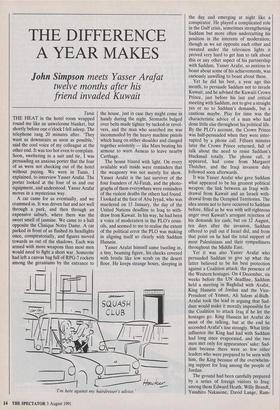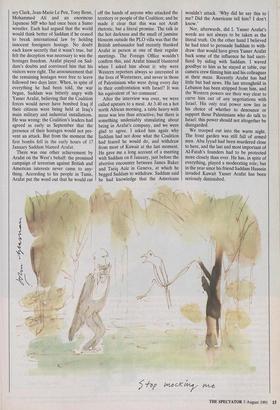THE DIFFERENCE A YEAR MAKES
John Simpson meets Yasser Arafat
twelve months after his friend invaded Kuwait
Tunis. THE HEAT in the hotel room wrapped round me like an unwelcome blanket, but shortly before one o'clock I fell asleep. The telephone rang 20 minutes after. 'They want us downstairs as soon as possible,' said the cool voice of my colleague at the other end. It was too hot even to complain. Soon, sweltering in a suit and tie, I was persuading an anxious porter that the four of us were not checking out of the hotel without paying. We were in Tunis, I explained, to interview Yasser Arafat. The porter looked at the four of us and our equipment, and understood. Yasser Arafat moves in a mysterious way.
A car came for us eventually, and we crammed in. It was driven fast and not well through a park, and then through an expensive suburb, where there was the sweet smell of jasmine. We came to a halt opposite the Clinique Notre Dame. A car parked in front of us flashed its headlights once, conspiratorially, and figures moved towards us out of the shadows. Each was armed with more weapons than most men would need to fight a short war. Someone' had left a canvas bag full of RPG-7 rockets among the geraniums by the entrance to the house, just in case they might come in handy during the night. Stomachs bulged over belts made tighter by tucked-in revol- vers, and the man who searched me was incommoded by the heavy machine pistols which hung on either shoulder and clanged together solemnly — like Mars beating his armour to warn Aeneas to leave nearby Carthage.
The house blazed with light. On every available wall inside were reminders that the weaponry was not merely for show. Yasser Arafat is the last surviver of the four founders of Al-Fatah, and the photo- graphs of them everywhere were reminders of the violent deaths the others had found. I looked at the face of Abu Iyyad, who was murdered on 15 January, the day of the United Nations deadline to Iraq to with- draw from Kuwait. In his way, he had been a voice of moderation in the PLO's coun- cils, and seemed to me to realise the extent of the political error the PLO was making in aligning itself so clearly with Saddam Hussein.
Yasser Arafat himself came bustling in, a tiny, beaming figure, his cheeks covered with bristle like low scrub on the desert floor. He keeps strange hours, sleeping in I'm here against my hairdresser's advice.' the day and emerging at night like a conspirator. He played a complicated role in the Gulf crisis, sometimes strengthening Saddam but more often undercutting his position in the interests of moderation; though as we sat opposite each other and sweated under the television lights it proved very hard to get him to talk about this or any other aspect of his partnership with Saddam. Yasser Arafat, so anxious to boast about some of his achievements, was curiously unwilling to boast about these.
Yet he did his best, a year ago this month, to persuade Saddam not to invade Kuwait, and he advised the Kuwaiti Crown Prince, just before his last and critical meeting with Saddam, not to give a straight yes or no to Saddam's demands, but a cautious maybe. Play for time was the characteristic advice of a man who had done little else throughout his political life.
By the PLO's account, the Crown Prince was half-persuaded when they were inter- rupted by a phone call. Fifteen minutes later the Crown Prince returned, full of talk about the need to resist Saddam's blackmail totally. The phone call, it appeared, had come from Margaret Thatcher, and the Iraqi invasion duly followed soon afterwards.
It was Yasser Arafat who gave Saddam what appeared to be his greatest political weapon: the link between an Iraqi with- drawal from Kuwait and an Israeli with- drawal from the Occupied Territories. The idea seems not to have occurred to Saddam before, filled as he was with self-righteous anger over Kuwait's arrogant rejection of his demands for cash; but on 12 August, ten days after the invasion, Saddam offered to pull out if Israel did, and from that point on he had the total support of most Palestinians and their sympathisers throughout the Middle East.
Yet it was also Yasser Arafat who persuaded Saddam to give up what the latter believed to be his best protection against a Coalition attack: the presence of the Western hostages. On 4 December, six weeks before the UN deadline, Saddam held a meeting in Baghdad with Arafat, King Hussein of Jordan and the Vice- President of Yemen, Ali Salem al-Bidh.
Arafat took the lead in arguing that Sad- dam would make it morally impossible for the Coalition to attack Iraq if he let the hostages go. King Hussein let Arafat do most of the talking, but at the end he seconded Arafat's line strongly. What little influence the King had had with Saddam had long since evaporated, and the two men met only for appearances' sake: Sad- dam because there were so few other leaders who were prepared to be seen with him, the King because of the overwhelm- ing support for Iraq among the people of Jordan.
The ground had been carefully prepared by a series of foreign visitors to Iraq: among them Edward Heath, Willy Brandt, Yasuhiro Nakasone, David Lange, Ram- sey Clark, Jean-Marie Le Pen, Tony Benn, Mohammed Ali and an enormous Japanese MP who had once been a Sumo wrestler. Each had argued that the world would think better of Saddam if he ceased to break international law by holding innocent foreigners hostage. No doubt each knew secretly that it wasn't true, but felt the deception was necessary to win the hostages freedom. Arafat played on Sad- dam's doubts and convinced him that his visitors were right. The announcement that the remaining hostages were free to leave followed two days later. When, in spite of everything he had been told, the war began, Saddam was bitterly angry with Yasser Arafat, believing that the Coalition forces would never have bombed Iraq if their citizens were being held at Iraq's main military and industrial installations. He was wrong: the Coalition's leaders had agreed as early as September that the presence of their hostages would not pre- vent an attack. But from the moment the first bombs fell in the early hours of 17 January Saddam blamed Arafat.
There was one other achievement by Arafat on the West's behalf: the promised campaign of terrorism against British and American interests never came to any- thing. According to his people in Tunis, Arafat put the word out that he would cut off the hands of anyone who attacked the territory or people of the Coalition; and he made it clear that this was not Arab rhetoric, but a literal promise. The talk in the hot darkness and the smell of jasmine blossom outside the PLO villa was that the British ambassador had recently thanked Arafat in person at one of their regular meetings. The Foreign Office wouldn't confirm this, and Arafat himself blustered when I asked him about it: why were Western reporters always so interested in the lives of Westerners, and never in those of Palestinians who were dying every day in their confrontation with Israel? It was his equivalent of 'no comment'.
After the interview was over, we were called upstairs to a meal. At 3.40 on a hot north African morning, a table heavy with meze was less than attractive; but there is something undeniably stimulating about being in Arafat's company, and we were glad to agree. I asked him again why Saddam had not done what the Coalition had feared he would do, and withdraw from most of Kuwait at the last moment. He gave me a long account of a meeting with Saddam on 8 January, just before the abortive encounter between James Baker and Tariq Aziz in Geneva, at which he begged Saddam to withdraw. Saddam said he had knowledge that the Americans wouldn't attack. 'Why did he say this to me? Did the Americans tell him? I don't know.'
Nor, afterwards, did I. Yasser Arafat's words are not always to be taken as the literal truth. On the other hand I believed he had tried to persuade Saddam to with- draw: that would have given Yasser Arafat back some of the influence he had sacri- ficed by siding with Saddam. I waved goodbye to him as he stayed at table, our camera crew filming him and his colleagues at their meze. Recently Arafat has had little but bad news. His last stronghold in Lebanon has been stripped from him, and the Western powers see their way clear to carve him out of any negotiations with Israel. His only real power now lies in his choice of whether to denounce or support those Palestinians who do talk to Israel: this power should not altogether be disregarded.
We trooped out into the warm night. The front garden was still full of armed men. Abu Iyyad had been murdered close to here, and the last and most important of Al-Fatah's founders had to be protected more closely than ever. He has, in spite of everything, played a moderating role; but in the year since his friend Saddam Hussein invaded Kuwait Yasser Arafat has been seriously diminished.



















































 Previous page
Previous page